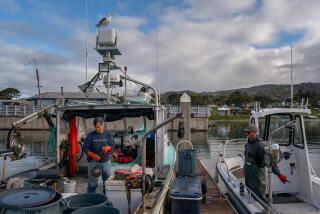House Bill Seeks to Lift Tuna Import Ban
WASHINGTON â Four Republican congressmen including Ron Packard (R-Oceanside) introduced legislation Thursday to lift the tuna import ban, which is aimed at protecting dolphins, and to end the âdolphin safeâ labeling requirement on canned tuna products.
The import restrictions have hurt the tuna industry in Southern California and Mexico. The other three lawmakers also are from the San Diego area.
Environmentalists immediately denounced the legislation as leading to the death of thousands of dolphins. Rep. George Miller (D-Martinez) said lifting the import ban âwould wipe out decades of protection for dolphins being killed in the tuna industry.â
Congress five years ago imposed a ban on importing tuna caught in parts of the eastern Pacific Ocean because fishermen were not taking precautions to protect dolphins that get into the tuna nets.
At the same time, Congress in a separate law enacted standards that must be followed if a tuna canning company uses the âdolphin safeâ label on its cans to assure that dolphins are being protected.
The proposed legislation would end the import ban and the labeling requirement, said Rep. Randy (Duke) Cunningham (R-San Diego), one of the billâs four sponsors.
âLifting this ban will help revitalize our crippled fishing industry,â Cunningham said. He said that it will produce new jobs in Southern California and Mexico, where fishermen also have been affected because they send much of their catch to the United States.
But the legislation brought a sharp rebuke from environmentalists.
âIt is an outrageous plan to gut the Marine Mammal Protection Act and sacrifice thousands of dolphins,â said David Phillips, executive director of Earth Science Institute.
Researchers at the institute near San Francisco have estimated that the import ban and the tuna canning industryâs âdolphin safeâ marketing policies have significantly reduced the number of dolphins killed in tuna nets.
According to the institute, the number of dolphins killed by tuna fishermen has declined from more than 130,000 in 1986 to less than 25,000 in recent years.
But Cunningham argued that in recent years a series of agreements between Mexico and the United States and the use of new fishing methods by the industry make the import ban unnecessary. He said the prohibitions have âdisplaced about 4,000 workers associated with the fishing industry.â
More to Read
Get the L.A. Times Politics newsletter
Deeply reported insights into legislation, politics and policy from Sacramento, Washington and beyond. In your inbox three times per week.
You may occasionally receive promotional content from the Los Angeles Times.










